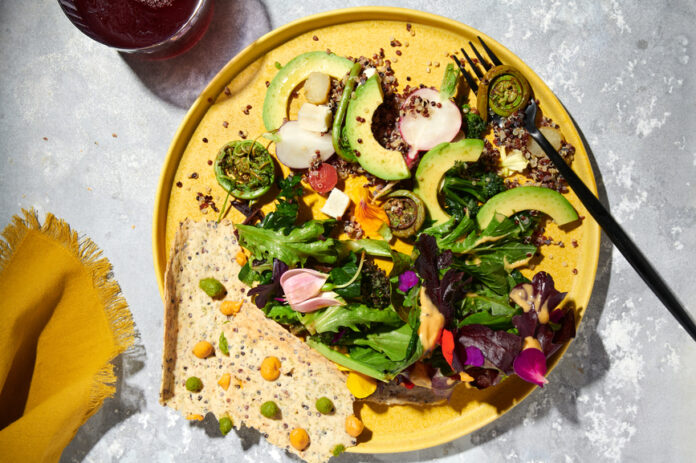Introduction:
In an era where health-conscious choices are paramount, discovering the #1 healthiest food for your well-being becomes a compelling journey. A balanced diet, replete with superfoods, can be your pathway to a healthier life. This article delves into the world of superfoods, highlighting their nutritional significance and the pursuit of the ultimate healthy choice.
The Significance of a Balanced Diet
A balanced diet is the cornerstone of good health. It ensures that you receive a wide spectrum of essential nutrients, vitamins, and minerals. Superfoods, a category of nutrient-dense foods, are hailed for their remarkable impact on health.
Superfoods and Their Impact on Health
Superfoods, as the name suggests, are foods that pack a powerful nutritional punch. They are dense in nutrients, making them an excellent addition to your diet. These foods have the potential to boost your overall health, enhance your energy levels, and even help prevent chronic diseases.
The Quest for the #1 Healthiest Food
With an abundance of superfoods available, identifying the single healthiest option can be perplexing. To make an informed choice, we’ll examine nutrient density and the specific health benefits of various superfoods.
Understanding Nutrient Density
Nutrient density refers to the concentration of nutrients per calorie in a food. A food is nutrient-dense when it provides a significant amount of nutrients relative to its calorie content. Nutrient-dense foods are often packed with vitamins, minerals, antioxidants, and other health-promoting compounds.
The Health Benefits of Leafy Greens
Leafy greens are nutritional powerhouses. Their low-calorie, high-nutrient profiles make them a crucial part of any diet focused on well-being. Let’s explore two exceptional leafy greens: kale and spinach.
Kale: The Nutrient Powerhouse
Kale, often referred to as the king of leafy greens, is an excellent source of vitamins A, C, and K, as well as calcium, potassium, and folate. It’s also rich in antioxidants, making it a formidable defender against free radicals.
Spinach: A Leafy Green Marvel
Spinach is another leafy green that deserves a place on your plate. Packed with iron, magnesium, and an array of vitamins, it supports a healthy immune system and offers benefits for cardiovascular health.
Nutrient-Rich Berries for Well-being
Berries, known for their vibrant colors and sweet flavors, are exceptionally rich in antioxidants. Two berries, in particular, stand out in the world of superfoods: blueberries and strawberries.
Blueberries: The Antioxidant King
Blueberries are an antioxidant-rich delight. They are known to improve cognitive function, promote heart health, and support a strong immune system. They are a prime example of the impact of superfoods on well-being.
Strawberries: Sweetness Packed with Nutrients
Strawberries are not just delicious; they are also packed with vitamins, fiber, and antioxidants. They offer a range of benefits, from skin health to digestion.
Fatty Fish: The Omega-3 Source
Fatty fish is a category of superfoods known for their high omega-3 fatty acid content. These fats are vital for heart and brain health. Let’s dive into two exceptional fatty fish choices: salmon and mackerel.
Salmon: A Superfood for Heart Health
Salmon is loaded with omega-3s, which help reduce the risk of heart disease. Additionally, it provides an excellent source of high-quality protein.
Mackerel: The Brain-Boosting Fish
Mackerel is another omega-3 powerhouse. It supports brain health, reduces inflammation, and offers an array of vitamins and minerals.
The Versatile Benefits of Nuts and Seeds
Nuts and seeds are nutrient-dense and versatile additions to your diet. They are rich in healthy fats, protein, and an array of essential nutrients. Two standout options are almonds and chia seeds.
Almonds: The Nutrient-Packed Snack
Almonds are an excellent source of healthy fats, vitamin E, and magnesium. They can help reduce hunger, making them a satisfying and nutritious snack.
Chia Seeds: Tiny Seeds, Big Benefits
Chia seeds are a superfood brimming with fiber, omega-3 fatty acids, and various essential nutrients. They can be a versatile addition to your diet, from smoothie bowls to chia puddings.
The Power of Quinoa: A Versatile Superfood
Quinoa, often called a super grain, offers a unique set of nutrients and health benefits. Let’s explore its nutrient profile and versatile culinary uses.
Quinoa’s Nutrient Profile
Quinoa is high in protein, fiber, and essential minerals. It is gluten-free and an excellent choice for those with dietary restrictions.
Health Benefits and Culinary Uses
Quinoa is not only nutritious but also versatile in the kitchen. It can be used in salads, as a side dish, or even in breakfast bowls.
- Stay Hydrated: Hydration is an often overlooked aspect of maintaining well-being. Don’t forget to drink plenty of water throughout the day, especially when consuming fiber-rich foods like berries and chia seeds.
- Listen to Your Body: Pay attention to how your body responds to these superfoods. Everyone is unique, and certain foods may benefit you more than others.
Now, let’s address some common questions about superfoods and their role in your well-being.
Incorporating superfoods into your diet can be enjoyable. You can add leafy greens to salads, blend berries into smoothies, prepare fish dishes, or snack on nuts and seeds. Experiment with different recipes to find what suits your taste.
Are there any side effects to consuming superfoods?
Superfoods are generally safe when consumed in moderation. However, some people may be allergic to certain foods. Additionally, overconsumption of specific superfoods can lead to imbalances, so it’s advisable to maintain a balanced diet.
Can I substitute these superfoods with supplements?
While supplements can provide certain nutrients, they don’t offer the same range of benefits as whole foods. It’s recommended to obtain nutrients from a balanced diet and consider supplements as a complement, not a replacement.
What is the role of hydration in maintaining well-being?
Hydration is vital for overall well-being. Drinking an adequate amount of water is essential to support digestion, nutrient absorption, and various bodily functions. Superfoods can contribute to your hydration needs, but water remains a crucial component of a healthy diet.
Are there any specific dietary restrictions when consuming these superfoods?
Superfoods are versatile and can often be incorporated into various diets, including vegetarian, vegan, and gluten-free. However, individual dietary restrictions should be considered, and it’s advisable to consult with a healthcare professional or dietitian when making significant dietary changes.













































